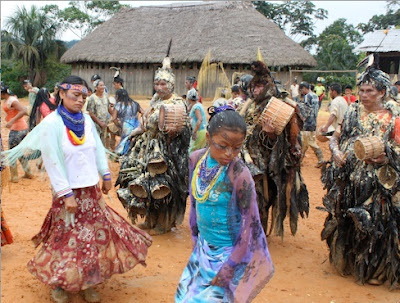Pope Francis in Ecuador calls for greater protection of the Rainforest and its people
 |
The Dignified Kichwa People in Resistance of Sarayaku and its rich culture is one of those that could to see affected by the government's intentions of Ecuador to expand the oil frontier. The Pope calls for them to be protected. Photo: Ukhamawa |
By Jim Yardley
Unofficial translation of the New York Times article
Unofficial translation of the New York Times article
On Tuesday (July 7, in Ecuador) Pope Francis called for increased protection of the Amazon rainforest and the indigenous peoples who live there, saying that Ecuador must resist the exploitation of its natural resources for "short-term benefits," in an implicit rejection of President Correa's policies.
In his final stops on a busy day, Pope Francis made environmental protection a central theme, invoking the Bible's principle that humans be stewards of creation while praising the way of life of indigenous peoples in tropical forests.
Several of the indigenous leaders who attended the final event of the day have been fighting against President Correa's policies to expand oil exploration in the Ecuadorian Amazon.
“The exploitation of natural resources, which Ecuador has in abundance, should not be preoccupied with short-term profits,” His Holiness told a group of civil society leaders during his last stop. “As guardians of these riches that we have received, we have an obligation to the entire society and to future generations.”
Francis had been expected to address the issue of Amazonian exploitation, having specifically included it in “Laudato Si,” the environmental encyclical released last month for global attention. In the document, Francis highlighted the risks of climate change while stressing the link between environmental destruction and the plight of impoverished sectors, including indigenous groups in South America.
Kicking off his South American tour in Ecuador, he said the issue would inevitably arise and present political complications as President Correa seeks to expand oil exploitation in the Amazon. After weeks of protests from the middle classes, Mr Correa brazenly attempted to appear publicly with the popular Pope.
Environmentalists in Ecuador have welcomed the Pope's encyclical, but Francis has hurt some feelings. Leaders of an indigenous association have complained that Francis had denied a request for a private meeting to discuss their efforts to fight oil production.
And it is too early to know whether the Pope's message – which did not include a direct reference to oil exploration – will influence Correa.
The Ecuadorian government relies on oil royalties for its revenue and Mr Correa has authorized a major expansion of oil exploration in the Ecuadorian Amazon, including in the Yasuní National Park, considered one of the most biodiverse places in the world.
In 2007, Mr. Correa proposed the concept of leaving the oil in the ground if other governments would contribute $1.4 billion to a trust fund to protect 4,000 square miles of primary forests. But when government contributions failed to arrive, Mr. Correa changed his mind.
Two years ago, a moratorium on new exploration ended and an approval process began that has paved the way for new oil production next year.
Oil pollution in Ecuador's rainforests has led to decades of litigation. Among the civil society activists who attended the pope's latest meeting on Tuesday were leaders of seven indigenous groups living within the Yasuní National Park. (Two other nomadic indigenous groups within the Yasuní live isolated from any contact with civilization.)
Last weekend, activists also published an open letter to the Pope online, seeking his direct intervention in protecting the jungle territories of Ecuador's indigenous peoples.
Franco Viteri, one of the activists (from the Kichwa people of Sarayaku) planned to present the letter to the Pope on Tuesday. “We ask you to intercede with the government of Ecuador so that it does not expand the oil frontier and mega mining in indigenous territories, especially in Yasuní,” the letter concludes. “We ask you to call on them to respect the constitution, treaties and international pacts on human rights and the environment.”
Read the Full text of the CONFENAIE letter (CONFEDERATION OF INDIGENOUS NATIONALITIES OF THE ECUADORIAN AMAZON) which was presented to Pope Francis.
Kevin Koenig, Ecuador program coordinator for the nonprofit Amazon Watch, said the pope's encyclical had encouraged environmentalists and indigenous leaders in Ecuador who fear Mr. Correa's plans for oil expansion could be devastating.
"President Correa's environmental policies go against the message of the Pope's encyclical," said Koenig, whose organization works with indigenous peoples to protect the Amazon.
He added that oil exploitation is the “biggest environmental battle for indigenous peoples’ rights in the Amazon today.” In his remarks on Tuesday, the Pope cited his own encyclical, asserting that the Amazon requires “greater protection because of its immense importance to the global ecosystem.”
He also cited the principle of integral ecology, a balance between economic development and environmental protection, returning to the theme in his remarks on Tuesday. “Ecuador – along with other countries that encompass the Amazon – has an opportunity to be a teacher of integral ecology,” he said. “We have received this world as an inheritance from past generations, but also as a loan from future generations, to whom we must hand it over.”
(Report with contributions from William Neuman and Carolina Loza)
![]()
